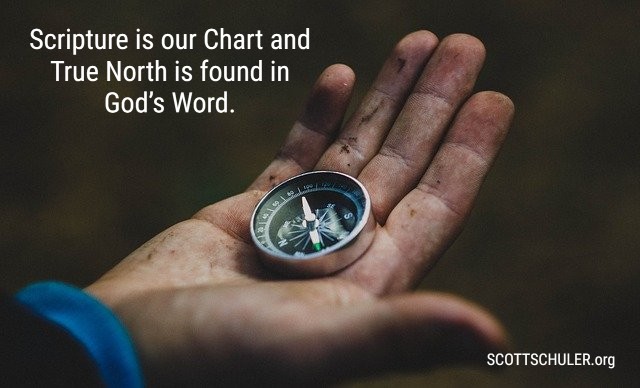By: Eddie Jones
Years ago I set out from Oriental, North Carolina to Ocracoke.
At the Neuse River junction marker I set a course for due east. This leg of our journey would take us to the tip of Brant Island shoal and last around one hour. Imagine my surprise when thirty minutes later I spied the marker indicating we’d reached the end of the shoal and could bear off north.
“Ah, Dad,” my oldest son said, “that marker says: Danger Zone.”
With binocs to my eyes, I read the warning. “Odd that the Navy would fly so close to the Ocracoke ferry run,” I said. “Must be a new bombing range practice area.”
We turned south a few degrees and continued.
An hour or so later, after spying three more such markers, we finally reached the tip of Brant Island shoal. Turns out our compass was off a few degrees.
I recently ran across an article entitled, “The Bible says it, but I don’t believe that settles it.” In it the author writes:
“We must read the Bible’s words in the light of their historical context and try to understand why the authors wrote what they wrote, and read its less humane verses (calls for vengeance, for example) in the light of its loftier verses (calls for love, mercy, and compassion). Most importantly as Christians, we are to read all of Scripture through the lens of Jesus Christ, his life, teachings, ministry, death, and resurrection. He is the only unmitigated Word of God.”
I read that passage and thought of how a few degrees of error can lead to danger.
When the author writes, “We must read the Bible’s words in the light of their historical context,” he seems to suggest that what God said 3,000 years ago might not apply to people today-that God does not expect his stories, promises, prophecies and poems to still be true, relevant and life-changing.
When the author writes, “We must try to understand why the authors wrote what they wrote,” he seems to suggest that the motivation of the scribe is of more importance than the motivation of God for prompting someone to write his words. No doubt a good many of those scribes who wrote what became “Scripture” had no idea others would read their words with such reverence, but God knew.
In Mark 2:25-26 we read Jesus asking the teachers of the law, “Have you never read what David did when he and his companions were hungry and in need? In the days of Abiathar the high priest, he entered the house of God and ate the consecrated bread, which is lawful only for priests to eat. And he also gave some to his companions.” (1 Samuel 21:1-6)
If Samuel had known that one day the Messiah would quote this text would he have been more eloquent in his prose? Hired a copy editor? Does knowing the motivation of Samuel alter Jesus’ message that the Sabbath is made for man, not man for the Sabbath?
When the author says “We must read all of Scripture through the lens of Jesus Christ” he seems to suggest that the life of Christ as recorded in the four Gospels is our main guide for reading God’s words-that the Holy Spirit sent by God to guide us in all truth is lacking.
When I got back to Oriental I paid a professional to calibrate the compass. To do this he kept the compass in place and then rotated the chart until the compass needle was pointing due north in sequence with the magnetic north line.
Scripture is our chart and True North is found in God’s Word.
If our compass is off even one degree we may, in time, shipwreck our faith (1 Timothy 1:19). Align your compass to God’s Word. Only then can you be certain of reaching your eternal destination safely.
Eddie Jones is a member of North Raleigh United Methodist Church who attends worship services at Bayleaf Baptist. He minored in religion at Meredith College. (Yes, Eddie knows Meredith is a girls’ school. He was lucky in that way 🙂 He has served as a Methodist Youth Fellowship counselor, middle grade, high school, and adult Sunday school teacher. He is co-founder of Christian Devotions Ministries and is a “pirate preacher.”


The Conversation
Love this, and will share…. a wonderful message for us all!
Keela Johnson